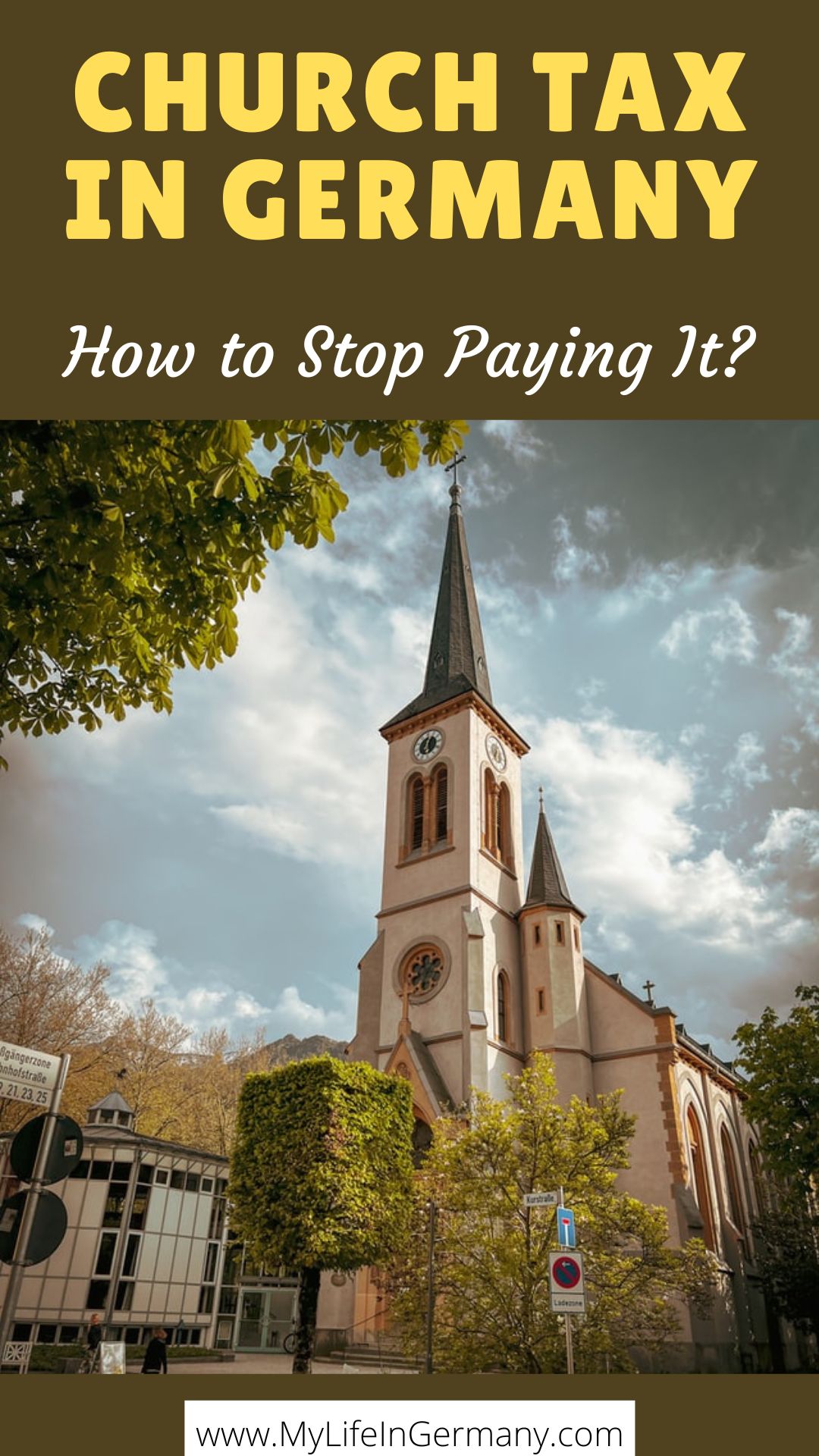This post contains affiliate links. It means that if you click on the links and make a purchase, we will receive a small commission at no additional cost to you. This allows our blog to continue providing you with free information. We only include links and products that we truly believe in. You can read the full disclosure here.
Moving to Germany or new in Germany? Check out our Resources Page for all the help you need!
What is church tax in Germany? Do you know if you are paying for it now? And more importantly, how to stop paying it? In this guide, we will tell you everything you need to know about church tax in Germany. This includes the amount and calculation, the different types of church tax in Germany, how to stop paying it, and what are the consequences.
Table of Contents
ToggleA short summary of church tax in Germany
If you don’t have much time, here are some important points about church tax in Germany:
- If you indicate that you are Catholic, Protestant, or Jewish when you register your address in Germany, you will be liable for church tax even when you are a foreigner.
- The church tax is deducted from your payslip. Your employer will withhold the tax and forward it to the local tax office.
- To stop paying the church tax in Germany, you need to leave the church. Depending on your region, you need to go to a different office and pay usually up to a 35 EUR fee to leave the church.
- If you leave the church, you cannot do certain things such as getting married or baptizing a baby in the church.
- Lying about your religion may result in a big tax bill in Germany if you get caught by the church.
- The church tax amount you paid is deductible in your tax return in Germany.
Scroll down and keep on reading for everything you need to know about church tax in Germany.
Disclaimer: This article is intended to provide you with a brief overview of church tax in Germany. This blog is not qualified to give you any tax advice according to German law. If you need more details and specific advice on your personal situation, we would highly recommend you to consult a tax adviser or the German tax office.
Introduction
A few months after I met my German husband (my boyfriend back then), we were comparing our payslips. We just wanted to find out what was causing the difference between our net salary. That was when we found out an extra line in his payslip: the famous church tax.
As a foreigner in Germany, I have never heard of a church tax. My husband was never religious. And he was paying about 60 EUR per month. For years!
I couldn’t understand this. The first thing I asked him to do was to unregister himself from the church. One concern, of course, was that we wouldn’t be able to get married in Germany in a church if he unregistered himself. But we were not going to pay this amount of money just because of getting married in a church.
So, he unregistered. We ended up getting married in New Zealand, by the way. And happily ever after (without the church tax and saving thousands of EUR in the long run).
Why is there a church tax in Germany?
The church tax system is in place since 1919. Almost every other person in Germany is paying the church tax. The Protestant and Catholic churches collect more than 13 billion EUR in a year. The money is used for the maintenance of the churches, funding different social projects, and paying for administrative expenses and the staff.
Church tax is not only a German thing. Some other European countries such as Austria, Denmark, Finland, Italy, etc. also charge church tax.
Why are so many people in Germany paying the church tax?
If you try to talk with other German people, you will find out that most of them are paying the church tax without realizing it or thinking to do something about it. Let me tell you why. This is something rooted in their culture.
They were baptized when they were babies. And everyone around them was baptized as well. This is like a part of growing up. It is normal and they never question it.
It is also seen as something bad if you want to leave the church. When my husband tried to leave the church, the old lady in the local office was getting angry.
However, there are more and more people leaving the church over the years. On average, 300,000 people leave the church per year. One big motivation is to save the church tax.
Read also: How to Save Money During a Crisis – 8 Best Tips to Save and Earn
Which churches charge you church tax in Germany?
The following 9 religious communities are stated-recognized and they are allowed to collect church tax. These churches either collect church tax via the tax office in Germany, or they collect the tax by themselves.
Church name in German | Translation in English |
Evangelical churches | |
Catholic churches | |
Old Catholic Church | |
Jewish religious communities | |
Israeli religious communities | |
Free Religious Congregations | |
French Church in Berlin | |
Mennonite congregation in Hamburg-Altona | |
Unitarische Religionsgemeinschaft Freier Protestanten in Rheinland-Pfalz | Unitarian religious community of free Protestants in Rhineland-Palatinate |
The following religious communities can collect church tax but they choose not to.
Church name in German | Translation in English |
Orthodox Churches | |
Union of Free Evangelical Churches | |
Salvation Army | |
Jehovah’s Witness |
If you are a member of Muslim or Buddhist communities, you do not need to pay church tax as they are not state-recognized corporations
How much is the church tax in Germany?
The amount of church tax in Germany is based on 2 factors:
1. Your salary
Church tax in Germany is a surcharge tax and its calculation is based on the amount of another tax. It works similarly to the solidarity surcharge (Solidaritätszuschlag).
The calculation is based on the income tax amount (Einkommensteuer) you have to pay and minus child allowance (Kinderfreibeträge) if any.
Read also: Salary in Germany: Are you getting paid enough?
2. In which state do you live in Germany?
The church tax rate in Germany is 8% to 9% on your income tax. If you live in Baden-Württemberg or Bayern, you pay 8%. For all other states, you have to pay 9%.
An example calculation of church tax in Germany
To give you an example, here is a calculation of church tax in Germany.
If you live in west Berlin and earn 50,000 Euro per year, here is how much you have to pay for the church tax in Germany for 2024.
| EUR |
Yearly gross income | 50,000 |
Income Tax per year | 7,208 |
Church tax per year | 649 |
As you can see, the calculation of church tax in Germany is based on your income tax (9% in this case). Depending on how much you earn, you can pay close to a thousand euros each year.
On the other hand, if your salary is below the tax-free allowance (11,604 EUR in 2024), you do not have to pay income tax. It also means that you don’t have to pay church tax.
You can also use this calculator to quickly see how much church tax you have to pay.
Capping threshold for high-income earners
Depending on where you live, there may be a capping threshold (Kappungsgrenze) for your church tax amount if you are a high-income earner. With the capping threshold, the calculation of your church tax in Germany will be based on your taxable income instead (about 2.75% – 4%).
In some states, you will have to apply for the church tax cap by yourself. While in some other states, the tax office may do it for you automatically.
Read also:
Who needs to pay church tax in Germany?
Anyone (including foreigners) who is officially registered as a Catholic, Protestant, or Jewish has to pay church tax in Germany. For German people who have been baptized, they will have to pay church tax unless they exit from the church.
If you just moved to Germany, you will have to register your German address officially within 2 weeks. You will need to do so at your Citizens Registration Office (Bürgeramt or Einwohnermeldeamt) and then get a registration certificate (Anmeldung).
In the registration form, you will have to indicate your religion. If you indicate in the religion field that you are Catholic, Protestant, or Jewish, this information will be forwarded to the tax office in Germany. The tax office will link your tax ID with church tax. And you will see church tax being charged in your payslip later on.
Read also: Moving to Germany – Everything You Need to Know
How do you pay church tax in Germany?
There are 2 ways to pay church tax. In most cases, the collection is via the tax office. But some churches may collect the tax by themselves.
1. The tax office helps to collect the church tax
In most cases, the tax office in Germany will act as a collection agency for the church to collect the church tax.
For employees
If you are employed and liable for church tax, your employer has to withhold the church tax from your income and forward it to the tax office.
This is the same procedure just like when your employer withholds other taxes such as income tax and solidarity surcharge before paying your salary.
You can see if you are paying church tax by looking at your payslip in Germany. If you are paying church tax, you will see an extra line called “KS” (Kirchensteuer).
For self-employed people
Self-employed people usually need to pay income tax prepayments monthly, quarterly, or yearly. If they are liable for church tax, they will have to add church tax on top when they pay their income tax.
2. The church collects the church tax by themselves
When the tax office helps to collect the church tax, it will charge the churches an administrative fee of about 3%. So, some smaller religious communities (e.g. the French Church of Berlin) choose to collect the church tax by themselves to save the fees.
How to stop paying church tax in Germany?
The easiest way to avoid church tax is to indicate that you have no religion when you register your address after moving to Germany.
You can enter “oa” in the registration form, which stands for “keiner öffentlich-rechtlichen Religionsgesellschaft angehörig” in German. It means that you do not belong to any public religious society. With no religion, you will not be liable for church tax in Germany.
Unfortunately, many expats had no ideas about the consequences when they filled in the registration form. I know people who wrote in the form that they were Catholics/ Protestants just because they were at Christian schools in the past.
In these cases, even though they actually are not religious (they have never practiced the religion or been to any churches), they will be liable for church tax in Germany.
So, what should you do now if you are already paying church tax in Germany and want to stop it?
1. Leaving the church
The only way to stop paying church tax in Germany is to leave the church officially. This is called “Kirchenaustritt“. It is a bureaucratic process but doable.
Depending on where you live, you will have to go to the local court (Amtsgericht), the church, the Citizens Registration Office (Bürgeramt), or the registry office (Standesamt).
You can see in the below table which office you should go to and how much you have to pay.
State in Germany | Office to go | Fees |
Baden-Württemberg | Register office | 26.68 € on average, depending on the district |
Bayern | Register office | 35.00 € |
Berlin | Local court | 30.00 € |
Brandenburg | Local court | 0.00 € |
Bremen | Church | 0.00 € |
Hamburg | Register office | 31.00 € |
Hessen | Citizens Registration Office | 30.00 € |
Mecklenburg-Vorpommern | Register office | 12.00 € |
Niedersachsen | Register office | 30.00 € |
Nordrhein-Westfalen | Local court | 30.00 € |
Rheinland-Pfalz | Register office | 30.00 € |
Saarland | Register office | 32.00 € |
Sachsen | Register office | 35.00 € |
Sachsen-Anhalt | Register office | 30.00 € |
Schleswig-Holstein | Register office | 20.00 € |
Thüringen | Register office | 30.00 € |
Source: kirchenaustritt.de
2. Bring the necessary documents and money
If you are single, you just need to bring your ID/ passport and your registration certificate (Meldebescheinigung) with you.
If you are married, you should bring your marriage certificate (Heiratsurkunde) as well. Of course, you also need to bring your money to pay the fees stated above.
3. Getting your Church leaving certificate (Kirchenaustrittsbescheinigung)
Once done, you will receive your church leaving certificate. Make sure to keep this certificate with you forever. In case the tax office asks for it years later, you can show this as proof that you have officially left the church.
4. Stop paying church tax in Germany
So now, it is done! It may take up to 2 months for the church tax line to disappear from your payslip. Unfortunately, everything you have paid before will not be refunded. The money is gone forever.
Read also:
- Maintenance payments (Unterhaltszahlungen) – How to deduct in your German tax return?
- VAT in Germany – A Comprehensive Guide for Expats
What will happen if you do not pay church tax in Germany?
If you do not pay church tax, you can still go to service in the church. However, you may not be able to use certain facilities such as getting married in the church, baptizing a baby, having a Christian burial, working in the church, or in hospitals and schools run by the church.
So, before you decide to stop paying church tax in Germany, you should consider if these facilities are important to you. In fact, I know many people who continue to pay church tax because they want to get married in the church one day.
Can you lie about your religion to avoid church tax in Germany?
You may receive a big bill
Churches in different countries actually talk to each other. So, if you are a member of the church in your home country and you didn’t indicate that in Germany, you may get caught in the future. This is especially risky if your home country also has church tax.
If the churches in Germany find out that you are lying about your religion, you may receive a big bill in the end, asking you to pay back all the unpaid church tax in the past.
This can happen if they find out that you are a member of a church. For example, if you were baptized or if you attend church services regularly in your home country.
It doesn’t matter if you actually practice the religion
Some foreigners in Germany do not want to indicate their religion because they do not plan to go to churches in Germany and thus do not want to pay the church tax.
Some others don’t feel like they have a religion because they were baptized back home out of tradition and they have never practiced the religion.
Unfortunately, churches in Germany will not care if you practice the religion in reality or not when they charge you the church tax. They will just check your church record back home.
The best is to unregister yourself if you are not religious
So, to be safe, you will need to unregister yourself from the church. This may also mean that you will not be a member of the church in Germany as well as in your home country.
Do you have a tax question?
If you have a specific tax question, you can use Yourxpert to get a free online initial assessment from a tax advisor. Simply write your question in the below question box.
The initial assessment or recommendation is free of charge. If further actions are needed, you will get a non-binding offer with the price and you can decide if you want to take the offer.
Some other possible forms of church tax
In most cases, the calculation of church tax in Germany is based on your income tax amount. But in some cases, you may have to pay additional church tax.
You can see below some other forms of church tax that may apply to you depending on your situation, your church, and your region.
Church property tax (Kirchengrundsteuer)
In some regions in Germany, a church property tax is also charged.
The calculation of the church property tax in Germany is based on the property tax amount (Grundsteuer). About 10% of the property tax amount will be charged.
Read also:
Church tax on capital income
In 2024, if you have capital income that is over the tax allowance of 1,000 EUR per year, you will have to pay a capital tax (Kapitalertragsteuer) of 25%. An example is when you have a gain by trading stocks.
If you are liable for church tax in Germany, the calculation will also be based on your capital tax amount (on top of your income tax amount). Either 8% or 9% of your capital tax amount will be charged as a church capital tax, depending on your region.
You can ask your bank to withhold the church tax and forward it to the tax office for you. Or you can also choose to declare the church tax from your capital income by yourself. To do so, you can use the “Anlage KAP” (Form for income from capital assets) in your German tax return.
Read also:
- Best Online Broker Germany – Top 5 Comparison – English Guide
- The Best Investment to Profit From Inflation in Germany
- Invest in Germany to Make Money – English Guide
- Best Crypto Exchange in Germany – Compare the Top 5
Church tax on severance packages
If you receive a severance package from your employer, the amount is also subjected to church tax. However, you can try to apply for a partial waiver (Teilerlass).
The church will often waive half of the church tax, even though it is not legally required to do so. You will have to wait until you get your tax assessment notice (Steuerbescheid) to apply for the waiver.
Read also: Unemployment Benefit in Germany – Application Guide for Expats
Special church fee (Besonderes Kirchgeld)
A special church fee is a kind of church tax. Let’s consider the below situation:
- Your husband is a member of the church and is liable for church tax
- You have no religion and are not liable to church tax in Germany
- Your husband has no or very little income
- You file a joint tax return in Germany together with your husband
In this case, a special church fee may apply if your joint taxable income is over 30,000 EUR.
The special church fee is calculated based on your joint taxable income minus child allowance if any. This fee is lower than the normal church tax rate.
Level | Joint income minus child allowance (EUR)
| Special church fee per year (EUR) |
0 | Below 30,000 | 0 |
1 | 30,000 – 37,499 | 96 |
2 | 37,500 – 49,999 | 156 |
3 | 50,000 – 62,499 | 276 |
4 | 62,500 – 74,999 | 396 |
5 | 75,000 – 87,499 | 540 |
6 | 87,500 – 99,999 | 696 |
7 | 100,000 – 124,999 | 840 |
8 | 125,000 – 149,999 | 1,200 |
9 | 150,000 – 174,999 | 1,560 |
10 | 175,000 – 199,999 | 1,860 |
11 | 200,000 – 249,999 | 2,220 |
12 | 250,000 – 299,999 | 2,940 |
13 | From 300,000 | 3,600 |
How to avoid the special church fee?
The special church fee is controversial because you are kind of forced to pay the fee even though you have no religion. Not all churches charge special church fees. But if you are liable for a special church fee, there are 2 ways to avoid it:
- Your husband exits the church so that he is not liable for church tax anymore
- You file your tax separately from your husband
Note that filing your tax separately means that you will lose any savings by combining your tax return. These savings are usually much more than the special church fees you have to pay if you file a joint tax return.
General church fee (Allgemeines Kirchgeld)
Depending on your church and region, you may have to pay a general church fee as well. The general church fee is collected by the churches themselves (not via the tax office). The money will be used for supporting the local churches, e.g. renovation costs.
The amount charged is usually based on your income. The fee will be charged once a year and it is usually up to 120 EUR. You can declare the general church fee as a special expense in your German tax return.
Is church tax deductible in your tax return in Germany?
Yes, you can deduct the full amount of church tax you have paid in your German tax return.
You can declare the amount as a special expense by using the “Anlage Sonderausgaben” document. Declaring the church tax will reduce your income tax amount. It will in turn reduce your church tax in Germany as its calculation is based on your income tax.
If you pay church tax voluntarily to support your church, or if you make a donation to the church, you can also claim these amounts in your German tax return using the same “Anlage Sonderausgaben” document.
Pro tips: You can use English software such as SteuerGo to submit your tax return in Germany. Just register for free and discover how easy it is to get an average tax refund of more than 1,000 EUR online. You only need to pay once when you submit the tax return.
Pin it for later:

Disclaimer
Please be aware that this article is intended to provide you with a brief overview of church tax in Germany. The information and tips in this article are based on personal experiences and thorough research.
This blog is not qualified to give you any tax advice according to German law and we do not accept any form of liability resulting from reading this article. Our blog makes no guarantee as to the accuracy or timeliness of the information in this article. If you need more details and specific advice on your personal situation, we would highly recommend you to consult a tax adviser or the German tax office.
Do you pay church tax in Germany because of your religion? Or do you plan to stop paying church tax in Germany by leaving the church? Leave a comment below to share your experience or any tips on this topic!
Moving to Germany or new in Germany? Check out our Resources Page for all the help you need!
If you found this article helpful, consider supporting this website by buying me a coffee. Every small donation helps to keep this blog alive. You can also ask me any questions here. Buy me a coffee







